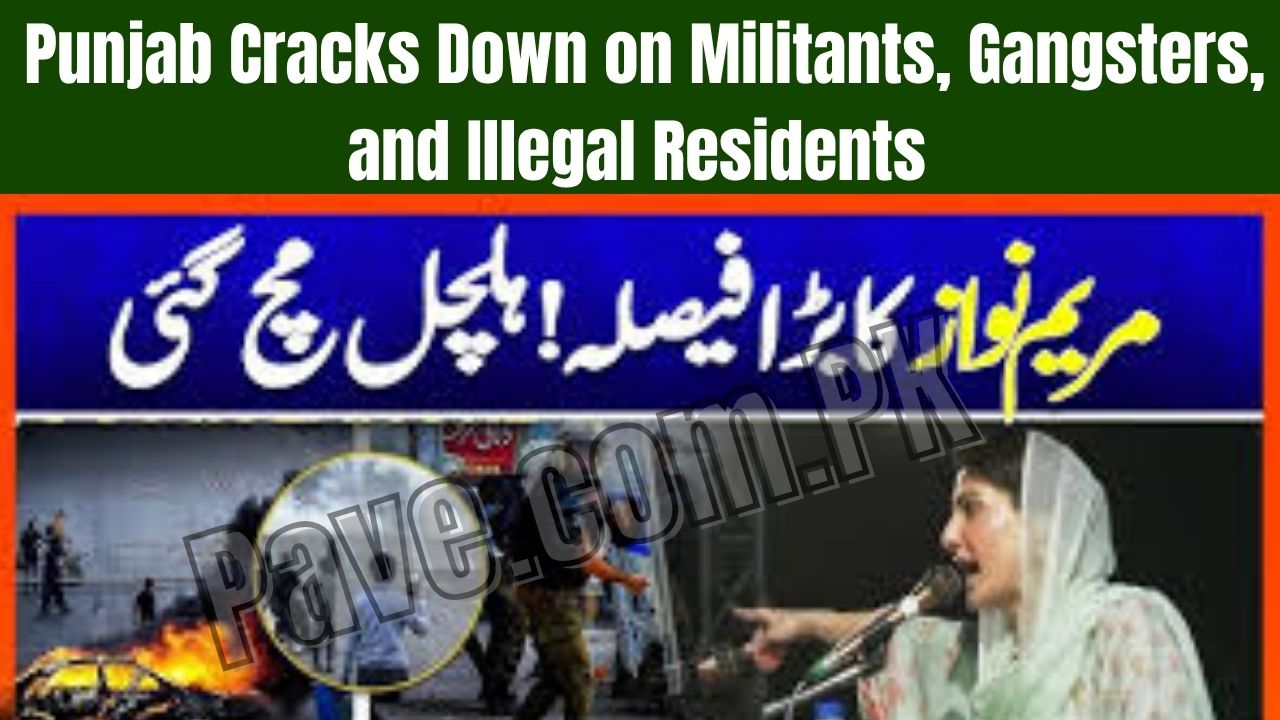Punjab Cracks Down on Militants, Gangsters, and Illegal Residents
The Punjab Government has officially launched a sweeping crackdown against militants, gangsters, and illegal residents across the province — signaling a zero-tolerance policy for anyone posing a threat to peace and public safety. The operation, backed by the Punjab Police, Counter-Terrorism Department (CTD), and local administration, aims to eliminate extremist hideouts, dismantle criminal networks, and verify all undocumented residents living in the region.Punjab Cracks Down on Militants, Gangsters, and Illegal Residents
According to government officials, this province-wide initiative is part of Pakistan’s broader security agenda to protect citizens and ensure law and order. The decision comes in response to growing intelligence reports of armed elements regrouping in rural belts and urban centers. Authorities have declared that Punjab’s land will “no longer be a safe haven for anti-state actors or criminal mafias.”
The crackdown includes door-to-door identity verification, smart-surveillance systems, and targeted police operations. Thousands of illegal residents are expected to face deportation or legal action under new security laws. The move has received widespread public support, especially from communities tired of gang activities, land encroachments, and extremist propaganda.
With this bold step, Punjab has made it clear — the rule of law will prevail, and the safety of citizens remains the government’s top priority.
⚖️ Background – Why the Crackdown Was Needed
For years, Punjab — Pakistan’s largest province — has faced a growing challenge from extremist organizations and organized crime groups operating under local protection networks. From rural tribal zones to the outskirts of Lahore and Rawalpindi, law enforcement agencies have traced arms smuggling, extortion rackets, and illegal settlements linked to militant financiers.
Read Also: Government Announces Major Changes in Passport Rules 2025
The situation intensified in 2024 when intelligence units uncovered sleeper cells operating in small towns and industrial hubs. Many of these groups used unregistered housing colonies and fake identity documents to conceal their movements. With the discovery of these threats, the government realized the urgency of decisive action.
The Punjab Home Department conducted a province-wide security audit in early 2025, which revealed the presence of illegal arms stockpiles, encroached land, and unverified foreigners. The findings triggered the latest crackdown — a unified strategy involving police, CTD, intelligence units, and NADRA.
🚨 Scope of the Crackdown – What the Operation Covers
The new security operation spans all 36 districts of Punjab. It targets multiple categories of offenders and focuses on eliminating the root causes of lawlessness.
🔸 1. Militants and Extremist Networks
CTD units are conducting intelligence-based operations to dismantle banned outfits, confiscate weapons, and arrest members involved in financing or spreading extremist ideologies.
🔸 2. Criminal Gangs and Land Mafias
The Punjab Police have intensified actions against land grabbers, extortionists, and gang leaders who have been terrorizing local populations.
🔸 3. Illegal Foreign Residents
Authorities are identifying unregistered residents, particularly those without valid visas or CNIC records. Immediate deportation proceedings are being initiated.
🔸 4. Fake Housing and Encroachments
Encroached government land and illegal housing projects are being reclaimed through anti-encroachment drives supervised by district commissioners.
🛑 Key Features of the New Policy
| Category | Action Plan | Authority Involved |
|---|---|---|
| Militants | Arrests, trials, and intelligence surveillance | CTD & Police |
| Gangsters | Asset seizure, extortion case reopening | Punjab Police & FIA |
| Illegal Residents | Verification and deportation | NADRA & Home Dept |
| Encroachments | Demolition and land recovery | Local Administration |
| Fake CNIC Holders | Data cross-check with NADRA | Interior Ministry |
🧾 Government’s Official Statement
The Punjab Chief Minister’s Office released a detailed policy brief stating that no individual or organization will be allowed to challenge the writ of the state. The statement emphasized:
“Punjab’s land belongs to its lawful citizens. Those who misuse it for extremist or criminal purposes will face full legal consequences. The government stands firm — zero tolerance for militancy, corruption, and illegal occupation.”
Home Minister and Inspector General (IG) Punjab confirmed that the operation is being monitored daily, with district reports sent directly to the provincial command center. Modern surveillance drones, digital ID verification vans, and mobile police units have been deployed for swift action.
Read Also: Big News: Punjab to Provide Rs 40000 Per Acre Interest-Free Loans to Farmers
🌍 Impact on Public Safety and Communities
The crackdown has already improved the law-and-order situation in several cities. Residents of South Punjab and urban outskirts have reported reduced extortion demands and fewer violent incidents.
Public cooperation is also growing, with citizens providing tips via police helplines and NADRA verification portals. Communities are being encouraged to verify tenants and employees online, ensuring no suspicious individual remains undetected.
Experts believe this move will rebuild public trust, attract investment, and restore a sense of security in areas previously under criminal influence.
💡 Benefits of the Crackdown
- Enhanced Security: Drastic reduction in terrorist and criminal movement across Punjab.
- Economic Stability: Recovered land to be used for development and housing projects.
- Data Accuracy: NADRA’s updated database will prevent fake ID registrations.
- Public Confidence: Citizens feel safer and more empowered to report crimes.
- Institutional Coordination: Unified efforts between police, FIA, and CTD for long-term peace.
📅 Implementation Timeline
| Phase | Period | Key Actions |
|---|---|---|
| Phase 1 | Jan – Mar 2025 | Identification of targets and database verification |
| Phase 2 | Apr – Jun 2025 | Arrests, deportations, and land recovery |
| Phase 3 | Jul – Sep 2025 | Legal proceedings and community outreach |
| Phase 4 | Oct – Dec 2025 | Monitoring, rehabilitation, and policy review |
🔍 Role of Law Enforcement Agencies
The Punjab Police, CTD, and Home Department are working in close coordination. Intelligence sharing has been made mandatory through the Provincial Security Dashboard, which tracks arrests, pending cases, and ongoing trials.
Every district police officer has been directed to personally supervise sensitive operations and ensure human rights compliance during raids. Female police officers have also been deployed for family-zone verification checks to maintain dignity and cultural respect.
🧠 Public Awareness & Citizen Responsibility
The government has urged citizens to stay alert and cooperate with authorities. A new public awareness campaign has been launched through television, social media, and local mosques to educate people about:
- Reporting suspicious activity via 15 helpline.
- Avoiding the harboring of unverified tenants.
- Ensuring residential and commercial CNIC verification.
- Supporting police checkpoints and ID checks.
Such public participation is vital to ensure the long-term success of this historic security campaign.
Read Also:Big News: Punjab to Provide Rs 40000 Per Acre Interest-Free Loans to Farmers
🏁 Conclusion
Punjab’s latest crackdown marks a decisive turning point in the province’s security policy. By targeting militants, criminal syndicates, and illegal residents simultaneously, the government has sent a strong message — no one is above the law. The operation represents not only a policing effort but also a moral and administrative renewal for the province.
The collaboration between CTD, Punjab Police, and NADRA demonstrates the strength of digital governance and modern law enforcement. As intelligence systems evolve, Pakistan’s ability to secure its citizens continues to grow.
Experts believe that these steps will create a foundation for lasting peace and stability, paving the way for investment, tourism, and social harmony. Citizens’ cooperation will remain essential, as public vigilance can help authorities sustain the current momentum.
Ultimately, this campaign is about reclaiming Punjab’s peace, dignity, and rule of law — ensuring that future generations inherit a province free from extremism, corruption, and fear. The message is loud and clear: Punjab belongs to its lawful, peaceful citizens — not to those who raise arms against the state.







